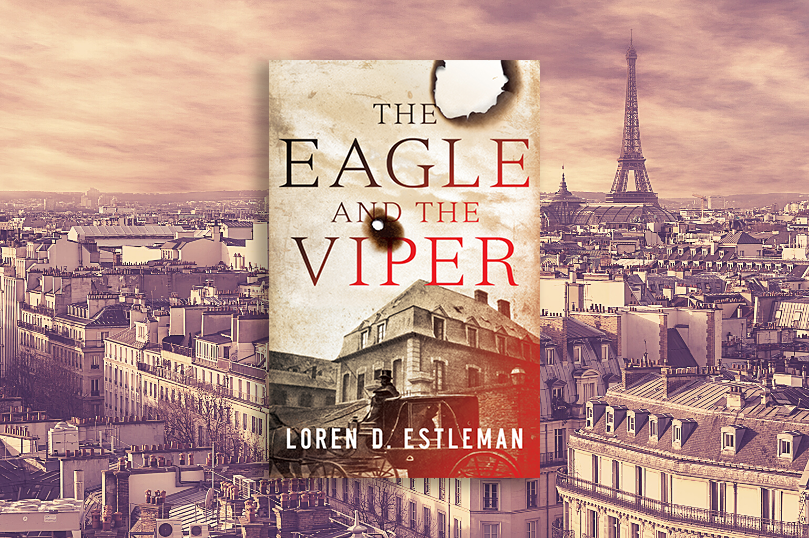Part high-octane suspense, part dire warning, The Eagle and the Viper from multiple-winning novelist Loren D. Estleman reveals how close our world came—at the dawn of a promising new century—to total war.
It’s a time of improvised explosive devices, terrorist training camps, international assassins, and war on civilians. It’s Christmas Eve, 1800.
This much is history: On Christmas Eve, 1800, an “infernal machine” exploded in one of the busiest streets in Paris, France, destroying buildings and killing innocent civilians. It wasn’t the first attempt on the life of Napoleon Bonaparte, First Consul of the newly minted Republic of France.
This much is exclusive to our story: Upon the failure of the Christmas Eve plot, the conspiracy takes a new and more diabolical turn.
Posterity knows what became of Napoleon: He led France into a series of military adventures that ended in his defeat, followed by decades of peace. But this future hung on a precarious thread. One man can make history; another can change it.
The Eagle and the Viper will be available on March 2, 2021. Please enjoy the following excerpt!
1
“This is no work for a soldier,” said Saint-Réjant. “I joined the army to get out of farming.”
“Did you gripe this much in the army?” Carbon asked. “Only until they made me a general.”
“You’d enjoy the work better if you’d served aboard ship. Once you’ve survived battle with the enemy, the sea offers you a second chance to die.”
“It wouldn’t make me any more wet.”
The rain had begun at dusk and settled into a monotonous drizzle, icy and glutinous. It dripped off their slouch brims, their noses too, and the ropy mud of the boulevard clung to their boots and made them heavy as sledges. It turned a level stretch into an uphill climb.
The date was 24 December, 1800 (4 Nivose, Year VIII by the Revolutionary calendar). Traffic was heavy, despite the weather. France had cut the heads off priests and abolished religion, but after a dozen years of austerity, Parisians insisted on celebrating Christmas Eve. Twice now, Carbon had almost been run down by carriages bearing drunken revelers toward the Rue Saint-Nicaise. After the second near miss he’d cajoled Saint-Réjant and Limoëlan to step down from the cart and help him lead the lame, wind-broken mare.
Carbon, a naval veteran, and one admittedly inclined toward recklessness for the sheer thrill of it, nevertheless considered his companions bad risks. Saint-Réjant, most recently a common bandit, had found that occupation more to his liking than his late service to the King, at the expense of his commitment to the Cause, and Limoëlan’s lust for vengeance was the very thing that had led the despised regicides to ruination. If this plan had a flaw, it was his partners.
“Shit!” Limoëlan stepped in a hole, turning his ankle and slamming him shoulder-first against the cart. It lurched. Something heavy shifted under the sodden pile of hay.
Carbon snatched his arm. “Watch your step, ass! You want to blow us all to ashes?”
A week earlier, on 17 Frimaire (December 17 to the rest of Europe), a grain dealer named Lambel had admitted to his shop in the Rue Meslée a thickset man with a blond beard and a large scar above his left eye. He walked with a rolling gait that spoke of years at sea. The man paused, breathing in the sweet smell of oats and wheat preserved in barrels; an odor the merchant himself no longer noticed. “Will you hear a proposition?”
“That would depend on the proposition,” said Lambel.
“I sell textiles. I recently came into possession of a shipment of brown sugar, which I hope to barter for bolts of cloth in Brittany.” “You’ll have no problem selling that lot in Paris. The women in the Tuileries would scratch out each other’s eyes for three yards of muslin. For silk they would do murder. I don’t exaggerate.”
“At the moment I have no way of transporting either the sugar or the cloth. I understand you have a horse and cart for sale.”
“I have for a fact.”
“Will you take two hundred francs?” “I would.”
Lambel was under no illusion that the man was trading in either cloth or sugar: He had been too quick to offer the money without inspecting the horse and cart. More likely his cargo was English Port, or some other product outlawed by government embargo. But the times were too uncertain to quibble over a fellow’s motives, and Marguerite, the mare, was very old and had a cataract. He helped the man with the scar hitch her up and watched him lead her out of the barn behind his place of business.
The man with the scar stopped at a wine shop, where he bought a spare Macon cask large enough to contain sixty gallons. Once again the customer explained that he intended to transport sugar. The proprietor helped him load the cask aboard the cart. From there he went to a shed he’d rented in the Rue Paradis near Saint-Lazare. He drew the doors shut, but they were joined poorly, and neighbors had a largely unobstructed view of what went on inside. One did not trespass, of course. Was a curious fellow resident no better than a voyeur? But there were few enough entertainments at the best of times, and most of them taxed by the Republic; a free show was not a subject for question.
The spectacle taking place across the narrow street was not without curiosity. When two more men appeared and set to work reinforcing the cask with ten stout iron bands, conversing in whispers all the while, it was assumed they were brandy smugglers, hardly an unusual sight that time of year, when a dram was just the thing to drive the cold from one’s bones, even at black market prices.
The neighbors paid them little attention after that. The mystery was explained, and as for reporting the activity, there was no telling what miseries may follow any kind of contact with the authorities, however civic-minded. Madame Guillotine seldom distinguished between accuser and accused.
François Carbon was neither a cloth merchant nor a brandy smuggler, but a Brittany-born sailor who came by his fearsome scar when a line broke loose during a storm in the Channel and the frayed end struck him above the eye, gouging out flesh like a piece of grapeshot. He had no sugar in his possession. He’d trained in the proper use of firearms and explosives under Georges Cadoudal, a French Royalist who operated a camp for insurgent expatriates in England, on the estate of a British peer in sympathy with the restoration of the Bourbon monarchy in France. (Where, after all, might it end? George III in exile or executed, and the American parvenu Thomas Jefferson in charge of the Empire? As well a bishop!) Although still in his thirties, Carbon had seen the government of his adopted country change hands three times.
He was determined to make it four.
The two men seen working with him on the cask were Pierre Robinault de Saint-Réjant and a master cooper named Jardin, who’d been recruited to forge and fashion the iron bands. Jardin thought the cask stout enough for its purpose, the storage of wine; but a job was a job, and the man with the scar paid up front and in cash, not in promises or poultry. Saint-Réjant wore his civilian attire with the air of a uniform, snug and tidy and with nothing dangling loose, his handkerchief tucked inside his sleeve. He’d served as a divisional general under Cadoudal, and knew little of casks and cart horses.
A fourth man who visited the shed from time to time was later identified as Joseph Pierre de Limoëlan, an aristocrat who’d seen his father borne, fettered and beaten, past jeering crowds to the Place de la Revolution to have his head taken from his shoulders. Cadoudal, a conservative commander not given toward impulsive promotions, had made Limoëlan a major general after he returned from patrol swinging the head of a Jacobin leader by the hair. Individual initiative must be rewarded.
When the cooper left, Limoëlan stood watch at the door while Carbon and Saint-Réjant drew the sacking off two kegs and poured black powder into the cask, then scooped broken and jagged pieces of stone from a barrow and mixed them with the powder; “to slash flesh and pulverize bone,” explained Limoëlan, who’d suggested the refinement, “and make as many good revolutionaries as possible.”
On Christmas Eve, a street musician strummed a mandolin and sang the refrain of a Catholic hymn outlawed in 1789. He frowned at the small collection of coins in his upturned hat, slung it onto his head without spilling them, a gesture perfected through repetition, and trudged off through the drizzle. Behind him, his corner on the Place du Carrousel glimmered in the light of torches struggling against the rain in front of the Tuileries Palace. Through those same gates, eight years before, King Louis XVI’s own gunners had escorted their sovereign to his place of imprisonment, and from there to his execution.
The musician passed three men loitering beside a shabby cart piled with hay, two of them knocking their heels against the wooden wheels to dislodge mud from the soles, a third squatting to feel the fetlocks of a bay mare that didn’t look as if it would last to the end of the street.
“Poor buggers,” he muttered to himself. All he had to look after was his mandolin.
A patrol of National Guardsmen came along a few minutes later in their blue uniforms and shining oilcloth cloaks, observing the trio still engaged in the same activity. The heightened presence of the sentries suggested that the man in the Tuileries—no king, this, Limoëlan thought; merely a contemptible clerk appointed to govern his betters—was preparing to venture out. The plotters’ intelligence was sound.
The patrol slowed as it approached. Seized with a wicked whim, Carbon gestured with his short-barreled pipe; what the English called a bulldog.
“Have you a light?”
The guardsman hesitated, shook his head, and continued walking with his companions.
“Was that necessary?” Limoëlan was the bloodthirstiest of the three and therefore the most cautious.
“I judged it so. In another moment he’d have been searching the cart. This way he knows we have nothing to hide.”
“What if he’d given you the light and searched it anyway?” “Have you ever tried to get a spark out of flint and steel on a night like this?”
“You mistake audacity for valor. It will mean your death.” “Sound advice from a highwayman.”
Limoëlan did not respond. If this plan had a flaw, the rash sailor was it; but Carbon was in command and so he swallowed his retort. He and Saint-Réjant had spent many such a dismal night waiting to waylay coaches on the stage roads along the coast—an unbecoming pursuit for generals; but even the great causes needed financing, same as mummery shows and ladies’ wardrobes.
For Saint-Réjant, his alliance with Carbon, a sailor-adventurer unhinged from reason by a blow at sea, and Limoëlan, a fanatic who would usher in a new Reign of Terror, only with the executioners and the victims reversed in favor of the monarchy, was far from ideal. If this plan had a flaw, it was they.
The clouds were bottomless. Foul drizzle soaked the conspirators to the skin and chilled them to the bone.
Perfect weather, Limoëlan thought, for a funeral of state.
Moving quickly now before another patrol could appear, the men backed the cart into position, not quite blocking the street, but obliging any passing traffic to slow and swerve round it. Carbon and Saint-Réjant tilted the heavy cask while Limoëlan unwound the oilcloth from a twisted length of twine and inserted it in the hole drilled in the top. The fuse was impregnated with gunpowder: the fast-burning variety intended for muskets.
“How much time?” Saint-Réjant helped right the cask.
Carbon’s teeth ground on his pipestem. “Who’s to say? The cocksucker is always early. Ask the Austrians.”
“I meant the fuse.”
“Then say what you mean. Six seconds, give or take.” “Give or take what?” Limoëlan asked.
“Give or take the life of one Corsican more or less.” Saint-Réjant crossed himself, an automatic gesture.
Carbon smiled in the darkness. “Careful, my friend. We are surrounded by atheists.”
Limoëlan did not smile. “In a little while they’ll be surrounding themselves.”
Copyright © 2021 by Loren D. Estleman
Pre-order The Eagle and the Viper—available on March 2, 2021!












